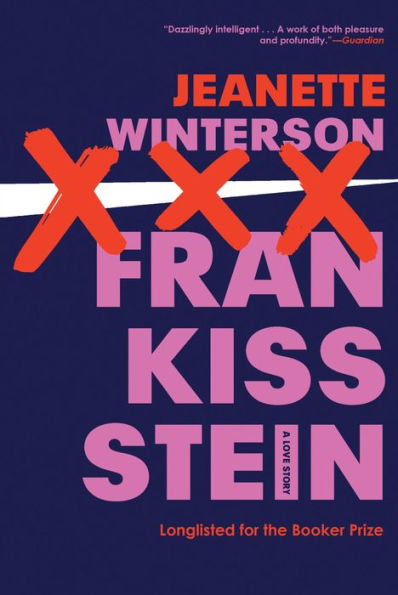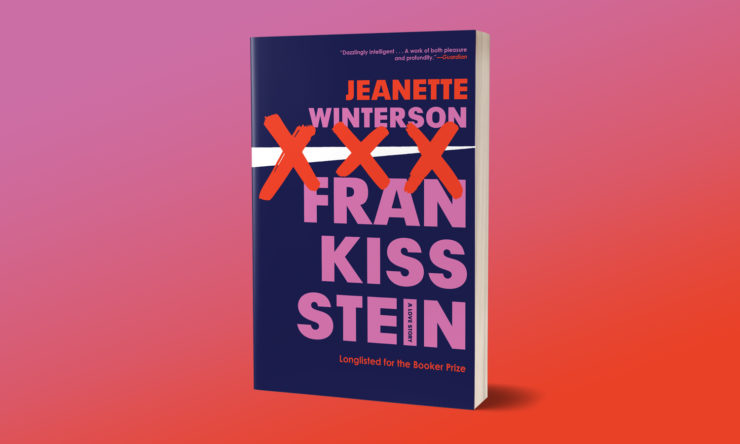There are two starting points in the new Booker longlisted novel from Jeanette Winterson, Frankissstein—one, the day in 1816 when Mary Shelley went for a walk along the wet shores of Lake Geneva and saw something that lead her to write the seminal novel Frankenstein, and two, a robotics expo in present day Memphis, where a trans doctor named Ry Shelley is interviewing the king of a potential sexbot empire, Ron Lord. Winterson jumps back and forth between the two times, in a staccato parallel narrative that explores duality and creation, and is as jarring as it is entertaining—jarring because we never know where the next chapter will take us, and entertaining because the voices of both sets of characters are just very alive, as varied as they are.
Winterson uses the names of the original group gathered in Villa Diodati during the summer Mary Shelley wrote Frankenstein as inspiration for her present day characters, and it isn’t too much of a stretch to connect the two, though of course, it’s not necessary either. Lord Byron, John Polidori, Percy Bysshe Shelley, Mary Shelley and her stepsister Claire Clairmont spent a very rainy summer along the shores of Lake Geneva, and in boredom challenged each other to write scary stories. Mary Shelley’s Frankenstein was of course the one brilliant outcome of this exercise, and while certain facts about it’s writing are now literary legend, Winterson does take some liberties with exploring what Mary Shelley’s internal thought process had been—not just about the book she wrote, but about politics, science, society and of course, motherhood. When Polidori & Byron wax on about how ‘the life-spark is male’, ‘not the soil, not the bedding, not the container; the life-spark’, Mary points out that ‘no living man has yet given birth to anything living…it is you, sir, who are made from us, sir.’ But the men laugh at her, and she acknowledges that ‘they respect [her], up to a point, but we have arrived at that point’. Winterson’s Mary is self aware, not just about how she is seen by men, but also about her own needs, as a wife, lover, mother, writer.
200 years later, Ry Shelley and Victor Stein talk about mitochondria, and how men can not pass it on, ‘only the mother passes it on, right back to the mother of us all.’ Victor Stein is a professor interested in cryogenics and reanimating human brains in order to digitise them, thus bringing them back to ‘life’. Ry Shelley is a trans doctor who supplies body parts to Victor for experimentation. Ry is love with Victor, does not fully trust him, yet is unable to deny him help—the two share a complicated relationship that often leaves Ry wondering if they (the character’s preferred pronoun) are being used for their ability to supply Victor with what he needs to get closer to his dream of creating a post-human future. Victor, meanwhile, feels immense appreciation for Ry as ‘future-early’—for what he sees in Ry as a move towards a future in which every person can inhabit a body of their choice with ease. But he believes humans will want to be more than human, more than transhuman too, perhaps. Stein does not believe in binaries: ‘once out of the body you will be able to choose any form you like, and change it as often as you like. Animal, vegetable, mineral. The gods appeared in human form and animal form, and they changed others into trees or birds. Those were stories about the future. We have always known that we are not limited to the shape we inhabit.’
Ry explains themselves as ‘two people [I] recognise.’… I am what I am, but what I am is not one thing, not one gender. I live with doubleness… I am fully female. I am also partly male. That’s how it is for me.’ The present day Ry Shelley and the Mary Shelley of 1816 have both chosen their personal narrative—both are more than just one thing, both feel (and fear) ambivalence from their lovers, and both are judged for being who they are. And they both provide their own Victor Franken/Stein with parts to create a new life, a new future narrative that could destroy them.
Buy the Book


Franissstein
While Winterson is sensitive in handling the more complex parts of Frankissstein, she makes sure to stay away from the didactic by use of humour, and satire. The character of Ron Lord, a recent divorced Welshman who has moved back in with his mum who is helping him his ‘XX-bot’ business, is hilarious. Almost a caricature, Ron is offensive but funny, absurd but surprisingly astute. He has tonnes of money, and not much sensitivity—but then, as he would say, he’s making sexbots, not raising emotional empathetic human companions (but he makes sure his sex-bots ask how your day was). The question then becomes—where do the two merge? When Ron and Victor meet, do they find anything in common, or are they at odds with their visions of the future? Throw in a religious woman called Claire who wants a Christian Companion doll that will help believers live ever after, a Vanity Fair reporter called Polly D who tells Ry being trans is ‘a good look’ for them, and an underground bunker facility where the dead lay in wait for another life, and you’ve got a clever, wicked—even gothic!—very contemporary story about what it means to be human.
Jeanette Winterson has never held back from writing whatever the hell it is that she wants to. From her hugely lauded memoirs Oranges Are Not the Only Fruit and Why Be Happy When You Can be Normal?, to historical fiction, to even a cookbook and a book on women’s fitness back in the 80s, she has always had an exuberance in the stylistic diversity of her work; taking joy in whatever she has chosen to write. And now she has chosen to create a frankenbook, and amalgam of two very different stylistic narratives, told in a range of vastly different but believable voices. Frankenssstein is a smart, funny look at the state of AI right now, and where it could easily be headed. It’s also a thoughtful exploration of what Mary Shelley’s life as a writer must’ve been like—young, afraid, dependent on her husband but smarter and more attuned to the world than the men around her gave her credit for. Frankenstein is about monstrous motherhood and loss, about having no control over what you have created, about learning that nothing is ever going to be just the one thing you expect of it, about the cruelty of humanity. Humans, Winterson is telling us, may be smart enough to create AI that surpasses us in intelligence, but to think that this AI will remain under our control simply because we gave it birth is probably a dangerous assumption. Mary Shelley wrote, ‘we destroy out of hatred. We destroy out of love’, but what happens when you create a creature that is more than human? We can teach empathy, but is that enough? Winterson reminds us of Shelley’s thought, that ‘suffering is ‘the mark of the soul [but] Machines do not suffer.’
Frankissstein is available from Grove Press.
Mahvesh loves dystopian fiction & appropriately lives in Karachi, Pakistan. She writes about stories & interviews writers the Tor.com podcast Midnight in Karachi when not wasting much too much time on Twitter.










